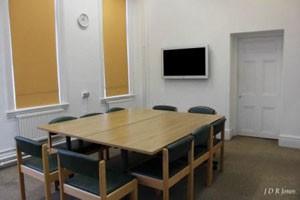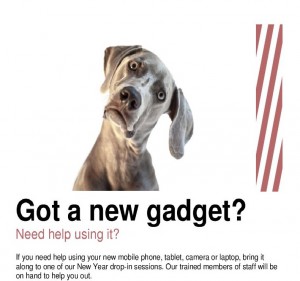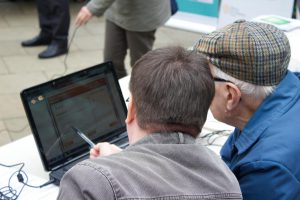Behind the Scenes: planning an IT event
Wow! More than 2,000 sessions delivered? How did we do that?
In the last three years the Information and Reference Library has planned and held 31 IT events alongside our extremely popular programme of one-to-one taster sessions. In all we’ve provided help and opened up new opportunities to more than 2,000 people; 1,200 attending group IT events and 900 more receiving one-to-one tuition. So what goes into the creation of one of these IT events? A lot more work than you might imagine.
Working with outside agencies
Many of our IT events are a part of larger national programmes such as Adult Learners’ Week (Festival of Learning) or Be Online so we need to register our participation with the appropriate organisation. We are a registered centre in the Online Centres Network and also hold events in conjunction with the RNIB, Age UK, National Libraries Day and others. Around this set calendar of events we plan our own workshops which focus on helping library customers discover our services, reaching out to specific user groups (such as businesses), and on improving digital awareness and access.
Planning the sessions
In 2015-16 we ran nine events. Planning for each of these falls to one of the Learning Team work groups and will usually comprise a librarian, the Library Supervisor and one or two library assistants. The type of IT event being organised (e.g. the national Get Online Week, or our local Try Before You Buy) will drive the decisions on the allocation of resources i.e. space, equipment and personnel: rotas need to be consulted and possibly juggled, events calendars need to be checked and IT kit needs to be be up and running and made available. It’s then all put it together with the schedule of topics mapped out and each one matched to staff members to deliver. It’s really quite a tricky juggling act!
Reserving space with the Facilities Manager

The Old Town Hall is a busy place and the Seminar Room (our favourite location for IT events) is frequently on hire to local groups, societies and businesses. So reserving the room with the Library Facilities Manager is a vitally important step. On the day we all pitch in to move the furniture and make sure we have enough tables and chairs for everyone. Our aim is to offer morning, afternoon, early evening and weekend sessions and thereby try to provide the most convenient times for our customers.
Reaching out
Generating publicity is an ongoing challenge. There are the obvious financial constraints, of course. But we’re also striving to reach people who may not use libraries and may not feel comfortable in seeking help to use IT. It’s also true that not everyone sees how useful computers and the internet can be. We therefore try to pick topics and themes to show how IT can be relevant, fun and time-saving. Once we’ve decided upon the sessions to run we have to get it all down on paper; creating an advertising poster and accompanying leaflets. Then we get the material sent out to all our libraries and to selected local agencies (local day centres, seniors groups, voluntary organisations, church halls and job centres) so that they can pass on information to interested clients or members. Our Corporate Communications team helps us to reach the local press.
 To make sure that all library staff know about and can promote the event in-house we give them advance notice of the sessions via the Library Services’ Weekly Briefing which is emailed to all staff. Here at the Old Town Hall a member of the Learning Team is tasked with creating an attractive display for the noticeboard.
To make sure that all library staff know about and can promote the event in-house we give them advance notice of the sessions via the Library Services’ Weekly Briefing which is emailed to all staff. Here at the Old Town Hall a member of the Learning Team is tasked with creating an attractive display for the noticeboard.
In addition to our paper-based publicity above we also heavily promote the event online through the Events in Libraries page of the Council website, on our Facebook page and through our Twitter feed.
The Information and Reference Library also publishes an IT Newsletter for library members who have asked to receive news about our upcoming events. Ask any member of staff and they’ll sign you up.
Getting a lesson ready
In tandem with getting out the publicity, each member of the Learning Team will prepare the session(s) they’ve been assigned. If it’s a session topic we’ve run previously, then it may only require checking that the existing presentations and handouts are still accurate and up to date. If they are they will only need to be printed in sufficient quantities. However, a new or revised topic will require greater preparation and some serious research. Luckily, we’re a library and we have books, computers, the internet and the expertise of colleagues we can draw upon. That said, it still requires hands-on experimentation with tablets, laptops and apps before taking screen-shots or photographs to create a brief but informative and attractive presentation with its equally professional handout. All these documents are saved for future use by colleagues and given version control numbers.
Final preparations
As the IT event approaches, staff make the final preparations for their sessions. Booking numbers are checked bookings and everyone is kept informed about the number of participants to expect. Feedback forms are printed, laptops and tablets charged. Directional signage within the building is put in place and (in the case of ITea and Biscuits) the snacks are acquired and laid out!
Running sessions
On the day the staff member leading the session will need to arrange the room, connect the laptop or tablet to the screen or projector, lay out the tablets or laptops if it’s a hands-on session, and ensure the handouts, useful books, relevant leaflets and feedback forms are available and on display.
There’s no doubt that whether it’s giving a presentation or helping someone in a hands-on workshop, the best part of these IT sessions is our customers. Few jobs are more satisfying than assisting new computer users to acquire skills and help others discover the amazing things they can do and learn online. Sharing information on a topic you’ve prepared is definitely one of the most rewarding aspects of our job!
And when the party’s over…
… there’s far more than just the tidying up to do. We now need to collate the data on numbers attended and analyse the feedback.
We encourage attendees to join the library, sign up to receive our IT Newsletter and to fill in a feedback form. These forms are important, not just because they let us know who attended, they also give participants a chance to tell us what they thought about the event, what went well, what we can improve upon and what suggestions they have for changes we could make or topics we might cover in future sessions. Where possible we act upon the feedback comments. Some things – like road noise filtering in from Hill Street, Richmond – are beyond our control.
The trainers too are asked for feedback so that we have the staff’s view of anything which may highlight back room issues we may need to address.
Then we gather the statistics: attendance, proportion of no-shows, number of sessions given and how participants heard about us including any significant points from the anonymised feedback. These figures are the concrete measure of our performance and inform our strategy and planning discussions.
And that’s it.
But before we can catch our breath we’re already starting again to get the next big event up and running!
[Elaine McClelland, Library Assistant]

